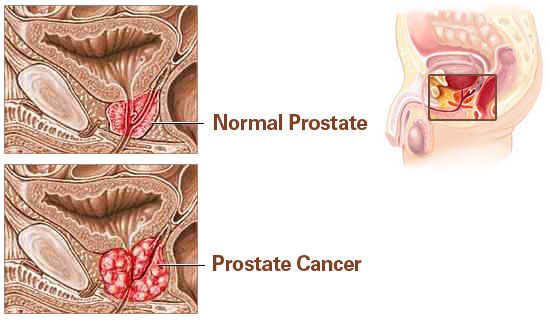Prostate cancer is uncontrolled growth of cells or in the prostate, a gland in the male reproductive system. About the size of a walnut, it is located below the bladder and in front of the rectum. Through the prostate runs a tube called the urethra that that carries urine from the bladder during urination and semen during ejaculation. Because of its location, prostate diseases, including prostate cancer, often affect urination, ejaculation, and sometimes defecation.

Although there are several cells types in the prostate, nearly all prostate cancers start in the gland cells. This kind of cancer is known as adenocarcinoma.
Most of the time, prostate cancer grows slowly. Occasionally, however, prostate cancer can grow and spread very rapidly.
Facts: Prostate cancer is the most common type of cancer in American men. According to the National Cancer Institute, approximately one out of every six American men will develop prostate cancer in his lifetime. Autopsy studies show that many older men, who died of other diseases, also had prostate cancer that was undiagnosed.
What are the causes and risk factors of prostate cancer?
The exact causes of prostate cancer are unknown. Listed below are several factors that can increase the risk of developing prostate cancer. Age: The risk of developing prostate cancer increases with age. In the United States, most men with prostate cancer are older than 65; it is rare in men younger than 45. Men who are 75 years and older have a one in nine chance of developing prostate cancer. Family history: Men with close family members (father or brother) who have had prostate cancer are at higher risk, especially if their relatives were young at diagnosis. This risk appears to be greater for men with an affected brother than for men with an affected father. Genetic: For unknown reasons, prostate cancer is more common among African-American men than white men. African-American men are twice as likely to die of the disease. Prostate cancer occurs less often in Asian or Hispanic men than in whites. No single gene, however, is responsible for prostate cancer, and many different genes have been implicated. Body weight: The risk of dying of prostate cancer increase with body weight. Diet: Red meat or high-fat dairy products appear to increase the risk for prostate cancer. A diet low in fruits and vegetables also increases the risk. High alcohol intake may increase the risk of prostate cancer, as well. Hormones: High levels of male hormones (androgens) may play a part in increased prostate cancer risk. Also, some research indicates men with high levels of the hormone IGF-1 are more likely to get prostate cancer.
What are the symptoms of prostate cancer?
Early prostate cancer is usually asymptomatic. Sometimes, however, prostate cancer may have symptoms that include:
- Urinary problems: inability to urinate or difficulty starting or stopping the urine flow, frequent urination (especially at night), weak or interrupted flow of urine, or pain or burning during urination
- Difficulty having or keeping an erection · blood in the urine or semen · frequent pain in the lower back, hips, or upper thighs · loss of bladder or bowel control
While these may be symptoms of cancer, but more often they are symptoms of BPH (benign prostatic hyperplasia), a condition under which the size of the prostate gland increases. BPH is not a form of cancer, nor does it raise your risk of prostate cancer. Yet it is important to report any of the above symptoms to a physician.
How to prevent prostate cancer
Although the exact cause of prostate cancer is unknown, some cases might be prevented. · Prostate cancer risk may be reduced by eating less red meat and fat while eating more vegetables, fruits, and grains. · Maintain a healthy weight. · Eat five or more servings of fruits and vegetables each day. Tomatoes, pink grapefruit, and watermelon are rich in substances (lycopenes) that help prevent damage to DNA and may help lower the risk of prostate cancer. Opt for whole-grain foods, such as brown rice, quinoa, and whole-wheat bread. Limit sweets and salt.
- Limit alcohol intake. Vitamin A supplements may actually increase prostate cancer risk. It is always a good idea to check with your doctor before taking vitamins or supplements.
- Talk with your doctor or health care provider about having a Prostate Specific Antigen test and digital rectal exams of the prostate gland. Many doctors recommend that these exams be done yearly beginning at age 50.
- If there is a history of prostate cancer in close family members, talk with your doctor about starting yearly screenings at a younger age.